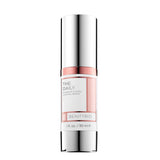THIS ARTICLE REFERENCES THESE PRODUCTS
 |
 |

|
 |
 |
| The Quench Eye Balm | The Radiance Face Oil |
Skincare can get really complicated, really fast. Before committing to an intense, 10-step K-Beauty regimen or calculating retinol percentages – stop. Go back to the basics: the ABCs of skincare ingredients. Learn more about these popular ingredients and vitamins in skincare below.
Vitamin A
Vitamin A in Skincare
Vitamin B3
Vitamin B3 in Skincare
Vitamin C
Vitamin C is an essential step in every skincare regimen, regardless of age or skin concerns. Since vitamin C is volatile, it’s important to look for a stable form so that actives can be delivered to skin at the optimum dosage. When certain forms of vitamin C are exposed to air, heat and light, they can become unstable, leading to inactivity and oxidization that can irritate the skin. However, a stable form of vitamin C is a power-packed antioxidant that brightens and shields against the free radicals that cause wrinkles, sagging and aging. Using vitamin C topically encourages collagen and elastin production in the skin, which together reduces the formation of wrinkles. Not only does vitamin C even skin tone and prevent against pigmentation damage, but it also infuses skin with radiance and luminosity. Double win!
Vitamin E
- Use Vitamin C in the AM: Vitamin C protects skin from pollution, UV damage and free radicals. Apply vitamin C in the morning to prevent against daily environmental damage.
- Use Vitamin A in the PM: Always apply retinol in the evening because it makes skin more susceptible to sunburns. Furthermore, the body cycles through its natural circadian rhythm at night, and the application of retinol amplifies this reparative process in the skin.
- Vitamin C and E are BFF: Vitamins C and E work synergistically to support each other’s antioxidant functions. Vitamin C promotes collagen production, while vitamin E maintains the cross links between collagen fibers to keep skin strong.
- Vitamin B Plays Nicely with Others: Vitamin B3 is found in a variety of skincare products from serums to face masks. B3 is often paired with other active ingredients such as hyaluronic acid or folic acid for impressive results.
SHOP THE STORY
 |
 |
 |
 |
 |
Sources
https://www.canyonranch.com/blog/beauty/the-skin-benefits-of-vitamin-a/
https://www.harpersbazaar.com/beauty/skin-care/a9876/vitamin-skin-care-guide/
https://www.skinstore.com/blog/skincare/b-vitamins/
https://www.elle.com/uk/beauty/skin/a36063/vitamins-for-skin-what-they-do-and-how-they-work/
https://www.allure.com/story/vitamin-e-skin-care
https://www.ncbi.nlm.nih.gov/pmc/articles/PMC3673383/
https://formulabotanica.com/best-form-vitamin-c-in-natural-skincare/
https://www.livestrong.com/article/503108-why-do-vitamin-e-c-work-well-together/
https://aldernewyork.com/blogs/the-guide/why-vitamin-c-with-vitamin-e-is-skin-nirvana
https://www.harpersbazaar.com.au/beauty/vitamin-b-skincare-18475
https://www.healthline.com/health/beauty-skin-care/niacinamide#takeaway




